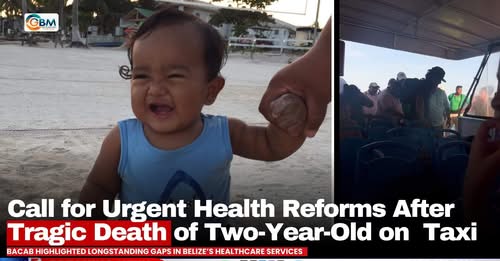SAN PEDRO TOWN, Belize – The heartbreaking death of two-year-old Kaleel, who passed away while being transported by water taxi from San Pedro to Belize City for emergency medical care, has sparked widespread grief and outrage. The tragedy has intensified growing calls for urgent reforms in Belize’s healthcare and emergency response systems, particularly in remote and island communities where access to lifesaving services remains severely limited.
A Preventable Tragedy?
The ordeal began when Kaleel was brought to a local polyclinic in San Pedro for urgent treatment. After an initial evaluation, doctors determined that he needed to be transferred to Karl Heusner Memorial Hospital (KHMH) on the mainland for advanced care. According to family accounts, however, the clinic allegedly declined to facilitate an airlift despite the child’s critical condition. Left without viable options, Kaleel’s family made the difficult decision to transport him by water taxi—a journey that proved too long and ultimately ended in tragedy.
Public Outcry and Community Grief
News of Kaleel’s passing has shaken Belizeans across the country. Many residents took to social media to share condolences and outrage, questioning why a toddler in medical distress was not given the fastest and safest route to lifesaving care.
“This was not just an accident—it was a failure of our system,” one resident wrote. “No parent should have to lose a child because emergency services weren’t available.”
Health Leaders Demand Change
Abner Bacab, a representative of Island Emergency Services, expressed sorrow and frustration over the loss. He emphasized the need for a full investigation into the decisions made that day and called for urgent improvements in Belize’s health infrastructure.
“So saddened to know about the loss of a child’s life…for whatever reason the child was not taken in an airplane but rather by water taxi. We do not know the circumstances of what exactly happened, but a thorough investigation needs to be performed,” Bacab stated.
He underscored long-standing challenges, including the lack of reliable emergency transport, inadequate resources in rural health centers, and limited access to advanced facilities.
Bacab urged the National Health Insurance (NHI) program to expand its coverage to include air ambulance and critical transport services, pointing out that neighboring countries like Mexico offer more comprehensive emergency benefits.
“Ambulance services should also be covered under these benefits for our Belizeans. In Mexico, the IMSS has its own hospitals and ambulances. Belize, we need to do better for our people,” he said.
The Role of Social Security and Systemic Gaps
Bacab also pressed the Social Security Board (SSB) to play a more active role in ensuring Belizeans receive the emergency care they contribute toward with weekly payments. He argued that the absence of such benefits leaves families vulnerable during life-or-death situations.
Health advocates and residents alike echoed these concerns, saying Kaleel’s death is not an isolated case but part of a broader systemic failure that has left communities underserved and underprotected.
Government Silence and Next Steps
As of now, Health and Wellness Minister Kevin Bernard has not issued a public statement. Calls for transparency and accountability are mounting, with many urging the government to not only investigate this specific incident but also enact long-overdue structural reforms.
A Call to Action
The tragedy of Kaleel’s passing is a painful reminder of how fragile life is and how urgently Belize’s healthcare system needs investment and reform. Advocates are calling for:
-
Guaranteed air ambulance services for all critical cases, regardless of financial status.
-
Expansion of NHI benefits to cover emergency medical transport.
-
Stronger accountability measures for clinics and hospitals when handling life-threatening cases.
-
Public education campaigns to ensure families know their rights in medical emergencies.
Remembering Kaleel
While reforms are debated and investigations continue, a grieving family mourns the loss of their little boy. Kaleel’s memory now stands as a symbol of why Belize must do better for its people. His story is fueling a nationwide conversation about equity, access, and the fundamental right to timely medical care.
